
Odinani, also known as Odinala, Omenala, Odinana, and Omenana, is the traditional cultural belief and practice of the Igbo people of south east Nigeria. These terms, as used here in the Igbo language, are synonymous with the traditional Igbo "religious system" which was not considered separate from the social norms of ancient or traditional Igbo societies. Theocratic in nature, spirituality played a huge role in their everyday lives. Although it has largely been syncretised with Catholicism, the indigenous belief system remains in strong effect among the rural, village and diaspora populations of the Igbo. Odinani can be found in Haitian Voodoo, Obeah, Santeria and even Candomblé. Odinani is a pantheistic and polytheistic faith, having a strong central deity at its head. All things spring from this deity. Although a pantheon of other gods and spirits, these being Ala, Amadiọha, Anyanwụ, Ekwensu, Ikenga, exists in the belief system, as it does in many other Traditional African religions, the lesser deities prevalent in Odinani serve as helpers or elements of Chukwu, the central deity.

The Igbo people are an ethnic group in Nigeria. They are primarily found in Abia, Anambra, Ebonyi, Enugu, and Imo States. Ethnic Igbo populations are found in Cameroon, Gabon, and Equatorial Guinea, as migrants as well as outside Africa. There has been much speculation about the origins of the Igbo people, which are largely unknown. The Igbo people are one of the largest ethnic groups in Africa.

Enugu is the capital city of Enugu State in Nigeria.

Enugu State is a state in the South-East geopolitical zone of Nigeria, bordered to the north by the states of Benue and Kogi, Ebonyi State to the east and southeast, Abia State to the south, and Anambra State to the west. The state takes its name from its capital and largest city, Enugu. The city acquired township status in 1917 and was called Enugwu-Ngwo. Due to the rapid expansion towards areas owned by other indigenous communities, it was renamed Enugu in 1928.
The Enugu State University of Science and Technology (ESUT) is a university in Nigeria that was founded as Anambra State University of Technology (ASUTECH) on 30 July 1980, by the Executive Governor of Anambra State, Chief Dr Jim Ifeanyichukwu Nwobodo. The creation of Enugu State out of Anambra State in 1991 by the then Military President General Ibrahim Gbadamasi Babangida, transformed ASUTECH into Enugu State University of Science and Technology.

Igbo land, east is the indigenous homeland of the Igbo people. It is a cultural and common linguistic region in southeastern Nigeria. Geographically, it is divided into two sections by the: an eastern and western.Its population is characterized by the diverse Igbo culture
Nkpor is a town in Idemili North local government area of Anambra state. The town of Nkpor had an estimated population of 109,377 in 2007. It is attached to the much larger city of Onitsha to the west, Oze to the north, Ogidi and Umuoji to the east, and Obosi to the south. The name 'Nkpor' is derived from the adulteration of the Igbo word nkpogha meaning 'repositioning'.Nkpor is known for its farming prowess. There is a maize known as ‘akpu aka Nkpor’ because of its robust yield and is reminiscent of Nkpor men who are often muscular. In ancient times, a rich man is known in Nkpor for his rich yam barn and the number of animals in his pen. An average Nkpor indigene does not buy foodstuff in the market and does not deny his visitors food. Nkpor is a traditional Community that worshiped the God of their ancestors before the advent of Christianity.

Oyi is a Local Government Area in Anambra State, Nigeria. It is home to the Oyi people. The towns that make up the local government are Nkwelle-Ezunaka, Awkuzu, Ogbunike, Umunede Umunya and Nteje.

Ogene is a style of Igbo music consisting of, and taking its name from, the ogene instrument, which is a large metal bell. The Ogene instrument has historically been made by the Igbo people of Nigeria. It is one of the most important metal instruments of the people.
Agwu Nsi is the Arusi of divination. The earth is inhabited by Agwu, a spiritual entity that goes beyond a mere force. Agwu possesses intellectual and volitive faculties, exerting significant influence on human affairs. Revered as the patron spirit of the dibia (diviner-healer) and the source of inspiration for exceptionally talented individuals, Agwu is closely associated with humanity's pursuit of fulfillment in society. It is believed that Agwu plays a role in enforcing various determinations, with the sick attributing their fate to him, creatively gifted individuals crediting his benevolent influence, and dibia being believed to be possessed by him. This page explores the nature of Agwu's possession, considering it as the culmination of his impact on human beings and examining its manifestation in individuals' experiences. Despite the transformative effects of modernization, Agwu's influence persists. Agwu is also known by other names such as Agwuisi and Agwunsi. While the popularity of these names may vary across different communities, there are no significant etymological differences among them. The simpler form, Agwu, encapsulates the complete essence of the concept. The suffixes isi and nsi, denoting head/first and poison respectively, serve as onomatopoeic expressions representing specific orders of relationships, characteristics, and effects associated with the spirit. Agwu is perceived as embodying tendencies that exhibit drastic moral opposites, often described in dialectical terms such as aka nri agwu (good/positive) and aka agwu (negative); ikenga agwu (support) and uruala agwu (subversion). Unlike other spiritual entities, Agwu is not characterized by a fixed inclination towards aiding or punishing, good or evil. Similar to spirits, Agwu has the capacity to both aid and punish. However, unlike them, he does not exhibit a consistent inclination in either direction.
Igbo culture are the customs, practices and traditions of the Igbo people of southeastern Nigeria. It consists of ancient practices as well as new concepts added into the Igbo culture either by cultural evolution or by outside influence. These customs and traditions include the Igbo people's visual art, music and dance forms, as well as their attire, cuisine and language dialects. Because of their various subgroups, the variety of their culture is heightened further.
Rems Nnanyelugo Umeasiegbu, is Nigerian professor, scholar, novelist, poet and folklorist from south-eastern Nigeria.. He was also a Principal Lecturer at the Institute of Management Technology, Enugu (1978-1982), and Head of Department, Mass Communications, IMT, Nigeria (1982-1986) and professor of oral literature at Nnamdi Azikiwe University, Awka as well as a consultant to Koruna Books Publications.
The Umuoji people are those whose roots can be traced to the town of Umuoji in Idemili North, a local government area in Anambra State, Nigeria. These people are from Igbo-speaking ethnic group whose early history is adversely affected by a lack of, or non-existent, written records. Umuoji is bounded by Ogidi, Ojoto, Uke, Abatete and Nkpor and has an estimated population of 80,000 people which includes local residents in its 23 villages and citizens in diaspora.

Ọhanaeze Ndigbo is an Igbo socio-cultural organization in Nigeria. The group aims to represent the interests of all Igbo communities within and outside Nigeria.

Inyi is a town in Oji River Local Government Area of Enugu State, Nigeria, approximately 60 kilometers from Enugu City and 35 kilometers from Nnewi. The name "Inyi" refers to a metaphor, which is an essential component in the creation of proverbs. It is the Igbo name for the red water tree. Due to historical events connecting the tree and the town's founder, he was given the name, which subsequently became the town's name. Inyi has several tourist attractions, including the Nwachighi stream, Ajala Inyi shrine, Okpu-ogho spring, Oji Alum Rapids, and the Sacred Heart Church. The town is also known for its pottery and traditional crafts. Visitors can also enjoy the hospitality of the Inyi people, who are known for their love of traditional music and dance. They also have a rich tradition of pottery and traditional crafts. The people of Inyi are primarily farmers, wine tappers, and petty traders. Women are skilled in pottery and the making of abacha varieties. Inyi people believe in God, the other gods, ancestors, and reincarnation. A popular festival in Inyi is the Ajala Inyi festival, which is held every year in October. Christmas and Easter are also celebrated in Inyi.

Ijele Masquerade, known as the biggest Masquerade in Sub-Saharan Africa, is a tradition of the Igbo people of Nigeria and was listed in the UNESCO Archives as an intangible cultural element in need of urgent safeguarding . In many communities in the state of Anambra in South-Eastern Nigeria, celebrations, burial ceremonies and other special occasions during the dry season to evoke fertility and a bountiful harvest feature the performance of the Ijele masquerade.
The Waawa clan of Northern Igboland, also referred to as Ndi Waawa, Wawa People, are a unique sub-group of the Igbo people in Enugu and Ebonyi State, Nigeria, consisting of several communities, who all speak a unique dialect of Igbo called Waawa. The most notable among these are the Agbaja and Ngwo which consist of peoples between the wooded lands of Awka to the rocky valleys of Enugu. The Agbaja are made up of communities in present-day Ngwo clan, Udi, Ezeagu, Umulokpa, Igbo-Etiti, Oji River, greater Awgu, Aninri and Enugu East Local Government Areas. Other notable parts of the Waawa clan include Nkanu, Nsukka, Abia, Nike, Agbani, Owo, and other communities in Enugu State. The Waawa are most notably associated with Chief Onyeama's people from Eke, who was the paramount ruler of Agbaja in the early 20th century.

Godfrey Mary Paul Okoye, C.S.Sp. was a bishop of the Roman Catholic Church in Nigeria. He was the first Bishop of Port Harcourt, serving from 3 September 1961 to 7 March 1970. After leaving the diocese of Port Harcourt, he became the second Bishop of Enugu, succeeding Bishop John Cross Anyogu.

Pericomo Damian Azubike Nwankwo Okoye, known as Pericoma, was a Nigerian singer, songwriter and traditionist. In addition to his music, he was known as a practitioner of Odinala, the traditional religion of the Igbo people.
Owoh Chimaobi Chrismathner professional known by his stage name Zoro or Zoro Swagbag, is a Nigerian rapper and singer who raps in Igbo language. Zoro was born and raised in Onitsha,Anambra State but is a native of Agwu,Enugu State.

















